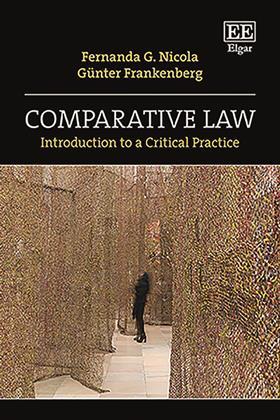Comparative Law: Introduction to a Critical Practice
Fernanda G. Nicola and Günter Frankenberg
£95, Edward Elgar
★★★★✩
This textbook is aimed at students and teachers but is also of interest to the wider legal community. It seeks to compare laws and legal process in respect of different cultures and traditions. The avowed aim is not just to explore different classifications (or taxonomies) of laws in different jurisdictions, but also to take a ‘critical’ and dynamic approach to the subject. This also involves analysing sometimes controversial topics (such as ‘gun control’ and the wearing of ‘the veil’) to examine how laws evolve and cross-relate across international borders.
The authors focus on a discrete number of legal disciplines (including property, contract and tort but also, more broadly, constitutions and legal histories) and compare how issues to which they relate are dealt with across frontiers. In the chapter on family law, for instance, thoughtful comparisons are made between the approaches of diverse societies to the issue of same-sex marriage. In the chapter on tort, the law relating to ‘wrongful birth and life’ is investigated, along with the religious and ethical aspects with which this topic is heavily bound up.
The text extends over 10 chapters and each chapter generally starts with a series of questions which the authors seek to answer in both conventional and critical practice theory terms, often by reference to helpful examples.

Finally, the authors attempt to reach a conclusion on how laws have evolved differently in different societies in the legal disciplines under consideration. The authors, Professor Fernanda G. Nicola and Emeritus Professor Günter Frankenberg, are respectively from US and German legal traditions, and they bring their own diverse legal backgrounds to their quite seamless analysis of different topics. They also make it clear that true ‘comparative law’ extends far beyond western legal traditions and rightly covers all legal systems everywhere.
The chapter structures, accompanied by footnotes within each chapter and a general bibliography and index at the end, show the care that the authors have taken to make the logic of the book flow as evenly as possible. This is, perhaps inevitably, not an easy read because of its philosophical subject matter. But it does seek to open the minds of its readers to the wide possibilities of the subject.
The authors are fond of the French word bricolage or its variant in describing the wide-ranging legal sources and examples brought together by the book. Indeed, the book is a real work of scholarship from which committed readers can only benefit.
The authors conclude that the purpose of their book ‘was to write a different kind of textbook on comparative law’. In that objective, they may well have succeeded.
Hopefully, a future edition of the book can comment on newly evolving areas of comparative law (including perhaps a nod to the effects of Brexit, and the convergences and divergences of law between the UK and the EU to which Brexit has given rise).
This is a rich seam of legal endeavour.
David Glass is a consultant solicitor at Excello Law































No comments yet